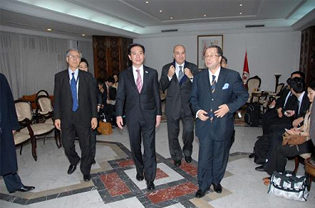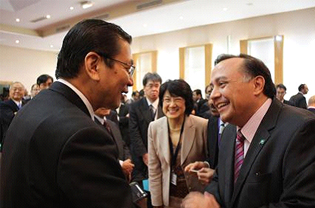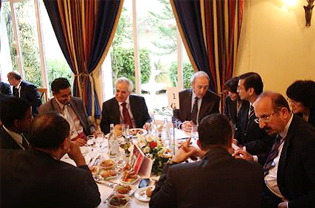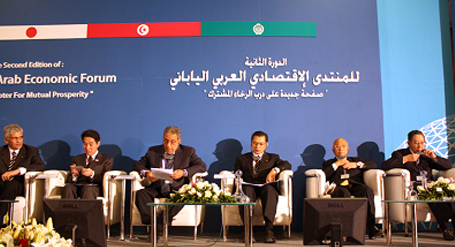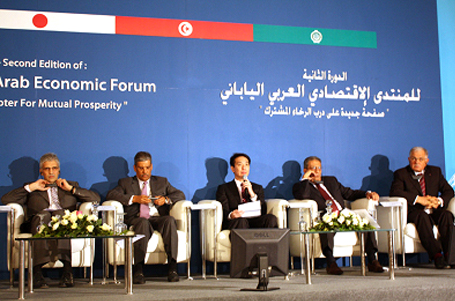- Opening Session
- Announcement of New Projects⁄Agreements and planned Activities
- Ministerial –level Meeting
- Sectoral Workshop
- Communiqué (Declaration de Tunis) & Press Briefing
- Closing Session
- Others (Welcome reception, Lunch, etc.)
1. Opening Session
At the opening session held on 11 December, opening addresses were delivered by H.E. Mr. Maehara, Minister for Foreign Affairs of Japan, H.E. Mr. Ohata, Minister of Economy, Trade and Industry of Japan, Mr. Watari, Chairman of the Board of Councillors of Nippon Keidanren, H.E. Mr. Moussa, Secretary General of the League of Arab States, H.E. Mr. Ghannouchi, Prime Minister of Tunisia, and others.
H.E. Mr. Maehara talked about Japan's economic diplomacy, which aims for mutual development, with Arab states that have been transforming into an attractive market and investment destination. He also expressed Japan would like to actively advance the FTA negotiations with the GCC countries and support the endeavors to promote peace in the Middle East. H.E. Mr. Ohata mentioned that the first forum has led to a concrete movement regarding economic cooperation between Japan and the Arab states, and expressed his hopes for such a movement to grow even wider and larger, and that the relationship of mutual trust be promoted and deepened through the second forum. He also addressed his expectations for the second forum to provide an opportunity for enhancing relationships among people in Japan and the Arab states, and to spawn the seeds of future business.
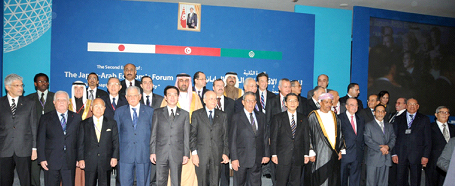






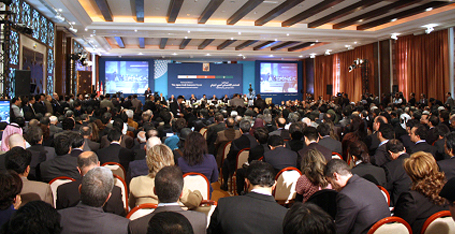
2. Announcement of New Projects ⁄ Agreements and planned Activities
Japan and Arab Countries have intensified their cooperation through various meetings, visits, projects and agreements. Especially, after the 1st Japan–Arab Economic Forum in December 2009, their cooperation had been accelerated by both sides. One of the purposes of this forum is to establish concrete cooperation and projects.
Based on this good environment, 10 new documents for cooperation and projects were agreed and signed on 10 December 2010. On the following day, 11 December 2010, 39 new cooperation and projects in the Arab region were announced at the 2nd Japan–Arab Economic Forum.
Examples of cooperation and projects are below (concerning all cooperation and projects, please see the Supplement 2).
- The cooperative projects in solar energy (Tunisia and Morocco: Signed by the Minister of Economy, Trade and Industry of Japan, and the chairman of NEDO)
- JCCME exchanged memorandums for cooperation with the General Union of Chambers of Commerce, Industry and Agriculture for Arab Countries (GUCCIAAC), the Federation of Arab Businessmen (FAB), the Arab Investors Union (AIU), and the National Investment Commission of Iraq.
- Establishment of a new portal website (JCCME and JETRO), as well as other projects by relevant organizations such as JCCME, JCCP, JBIC and NEXI.
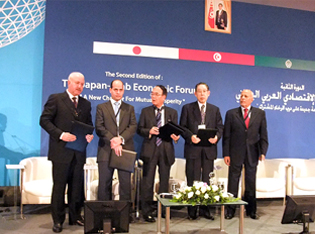
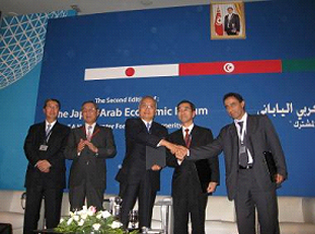
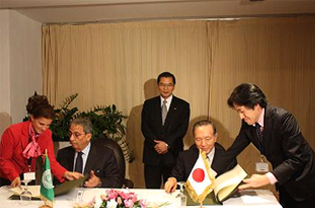
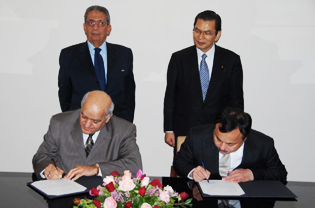
3. Ministerial–level Meeting
There were comprehensive discussions with a focus on a wide range of areas, on the themes of: 1. Energy and Environment; 2. Human Resource Development, Education and Science Technology; and 3. Investment, Tourism, Finance and Trade. The lecturers included executive leaders from Japan and minister–level officials from the Arab states.


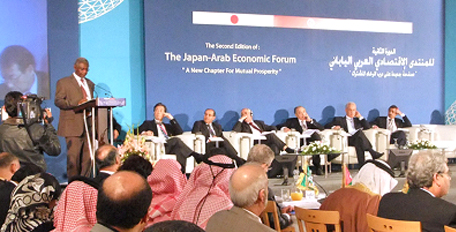




4. Sectoral Workshop
Views were exchanged frankly about Japan's strength and business chances in the Arab region, and the challenges on both sides, in the following fields: 1. Solar Photovoltaic Power and Solar Thermal Power; 2. The Arab–Japan Water Policy Dialogue; 3. Business Activities of Japanese Companies; 4. Nuclear Power; 5. Infrastructure (Construction, Railway, Financing the Infrastructure); and 6. IT, High Technology and Satellite.
In the sectoral workshops, Mr. Okamoto, President of JCCME, served as a moderator for workshops 1 and 4, Mr. Masakazu Ichikawa, Director General for Infrastructure and Advanced System Promotion, METI served as a moderator for workshops 2, Ms. Haruko Hirose, Former Ambassador of Japan to Morocco served as a moderator for workshops 3, Mr. Hamidi Tabba'a, Chairman of the Federation of Arab Businessmen, served as a moderator for workshops 5, and Mr. Tanikawa, Executive Director of JCCME, was moderator for workshop 6.
< Workshop 1: Solar Photovoltaic Power and Solar Thermal Power >
- 5 Speakers from each side made speeches about cooperation in the field of solar photovoltaic power and solar thermal power between Japan and Arab countries. There were about 180 participants in total (including more than 100 participants from the Arab side).
- The Japan side promoted its technology to gain recognition in the Arab region and to tie it to sales promotion activity.
- The Arab side introduced the potential of the Arab region and explained government policy and the result of cooperation with Japan in this field. The Arab side positively questioned technological cooperation and Japan personnel training with Japan.

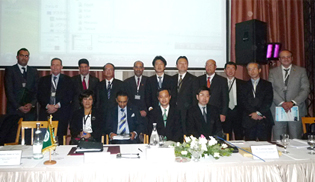
< Workshop 2: The Arab–Japan Water Policy Dialogue >
- 5 speakers from the Arab side and 4 speakers from the Japan side made speeches about cooperation in the field of water between Japan and Arab countries. There were about 120 participants in total (including more than 70 participants from the Arab side).
- Japan side made a presentation on the introduction of water business cooperation with Arab countries and the advantage of the technology of private Japanese companies.
- The Arab side outlined the needs, issues being faced by each country and their efforts to overcome them. In particular the Arab side introduced the issue of some uneven distribution of water resources, and signaled that it expected Japan's cooperation to improve this problem.
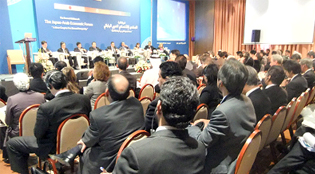

< Workshop 3: Business Activities of Japanese Companies >
- 5 speakers from the Arab side and 4 speakers from the Japan side made speeches about business activities of Japanese companies in the Arab region. There were about 150 participants in total (including more than 100 participants from the Arab side).
- The Japan side made a presentation of the current situation of business activities, problems and views to the future of the Arab region.
- The Arab side introduced the investment environment, the merits, and potential of the Arab region.
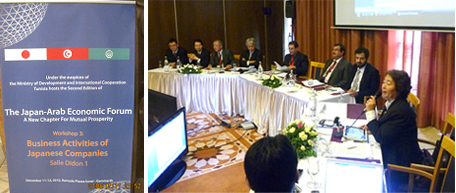
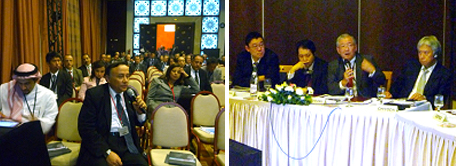
< Workshop 4: Nuclear Power >
- 5 speakers from each side made speeches about cooperation in the field of nuclear power between Japan and Arab countries. There were about 150 participants in total (including more than 100 participants from the Arab side).
- The Japan side explained Japan's governmental policy on nuclear energy, emphasis, and directionality in the future. Private companies promoted their technology and current activities in the Arab region.
- The Arab side introduced its approach to nuclear power, and clarified the issues, approach and the areas in which cooperation is possible.
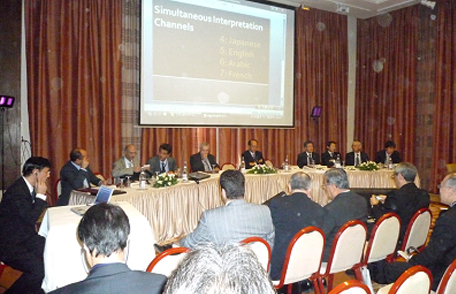

< Workshop 5: Infrastructure (Construction, Railway, Financing the Infrastructure) >
- 4 speakers from the Arab side and 6 speakers from the Japan side made speeches about cooperation in the field of Infrastructure, in particular railways, construction and infrastructure finance between Japan and Arab countries. There were about 200 participants in total (including more than 100 participants from the Arab side).
- Japan explained about safety, technical advantages, and energy efficiency of its railway related and construction industries. Japan introduced results of its work in the Arab region.
- The Arab side explained the progress of the policy of each country and problems in these fields. The Arab side expressed it expectation for Japan on technology and finance.



< Workshop 6: IT, High Technology and Satellite >
- 5 speakers from the Arab side and 6 speakers from the Japan side made speeches about cooperation in the field of IT, high technology and satellite related cooperation between Japan and Arab countries. There were about 100 participants in total (including more than 50 participants from the Arab side).
- The Japan side introduced business results and Japan's strong point in the fields of IT, high technology and satellite technology in the Arab region.
- The Arab side explained the necessity of establishment of related organization, human resources development, technology, and knowledge in this field. The Arab side showed high expectation for Japan about such advanced technologies that will be needed in the future in the Arab region.
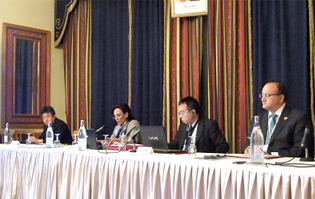


5. Communiqué (Declaration de Tunis) & Press Briefing
6. Closing Session
7. Others ( Welcome reception, Lunch, etc. )
